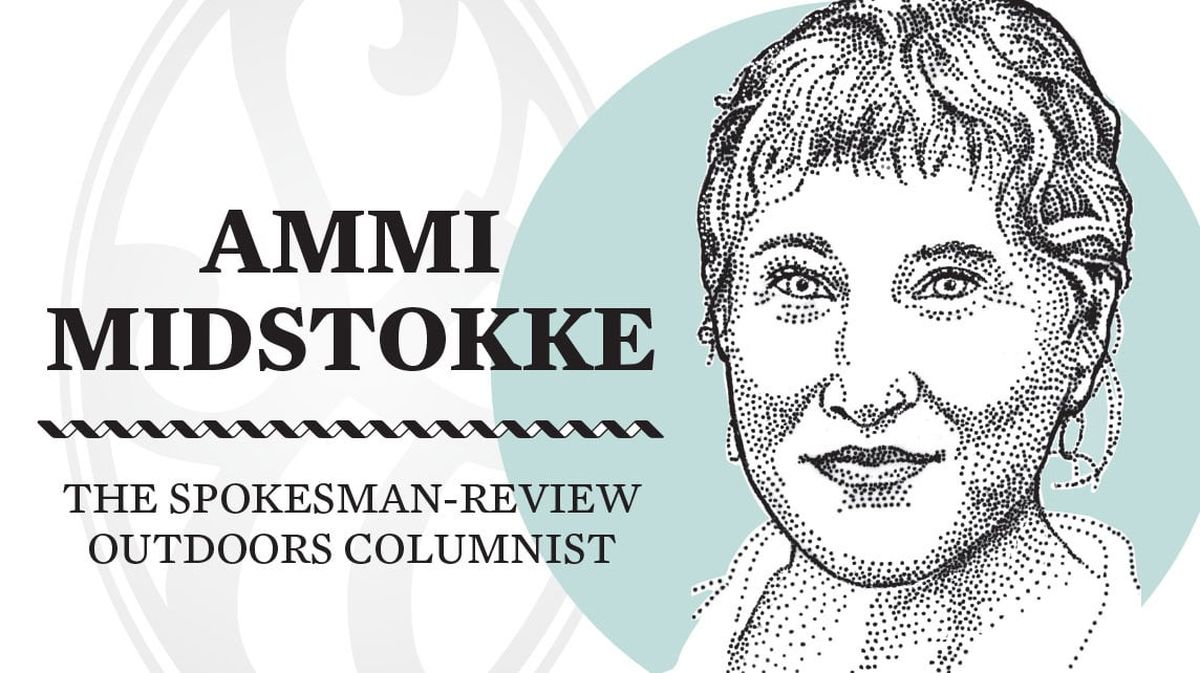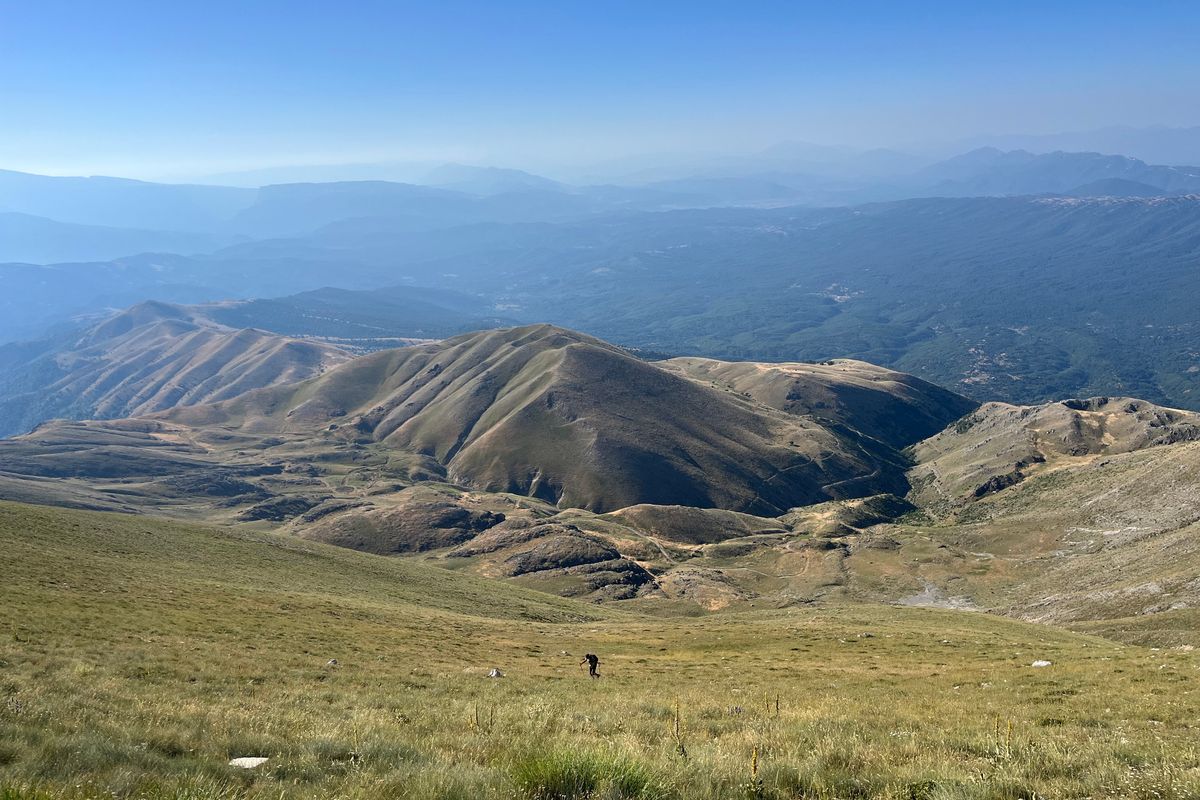Ammi Midstokke: The needless nature of language
On a cool summer morning as the fireflies are retiring into the lush green forests, Kristos Qyra is standing outside the stone wall of his house, a plastic grocery bag draped over his shoulder, a sickle in his hand.
Around his waist is a loop of twine without any noticeable purpose. His white sneakers and jean shorts imply a day far less adventurous than the one we have planned.
The rest of us are in full kit: trekking poles, quick-dry fabrics, trail shoes, GPS trackers, sunscreen. Kristos’ “essential 10” includes a bottle of water and an old water bottle filled with honey he harvested from his bees this morning.
He takes deep swigs of the stuff followed by a long pull of water, then flexes his biceps for me because the only language we share is a haphazard sign language and sound effects. This does not stop him from trying to communicate with me using words: random English ones, Greek, a few Russian ones, Italian, his mother tongue of Albanian, and I suspect a few made up words for good measure.
We’re climbing a mountain that is cut in half by the Albanian-Greek border. It is covered with a floral carpet of thistles, herbs, spiky coniferous shrubs, stinging nettles and a variety of pokey things that work their way through socks and the fabric of shoes with an undaunted determination to irritate. For as welcoming as the Greeks are, their thorny flora is as aggressive as a rabid porcupine. Yet hidden between the brambles and the briar are great swaths of flowering herbs. Thyme, oregano, mountain tea, mint and more than 100 other species. It is a forager’s delight.
I only piece bits of this man’s history together with village anecdotes and a flailing of hands that occasionally conveys something I can comprehend. Thirty years ago, he walked across the border and sheltered in this tiny Greek village. Somehow between then and now, he learned how to do just about everything. If he doesn’t know, he’ll try anyway. I’m not sure if he makes a living this way, or just trades labor for random animal parts (there is a goat head or something in our freezer a la his generosity).
It appears Kristos does not sleep, rising before dawn to fuss with the bees or descend to the river to clear the brush away from a defunct mill or to collect various vegetables from village houses where he’s invariably planted them. Wherever his hands touch the soil, something begins to grow. When we visit him in his garden by the river, he’s barefoot and barehanded, stretching wire fencing to fend off the wild boar.
“Kristos never shows up at my house without something in his hands,” my friend said, but it is a gross understatement of the man’s ability to gather.
He shows up at 7 a.m., 8, 11, then at regular intervals between lunch and midnight, and always with an offering. The collection of edibles grows on the table in the courtyard: Buckets of pigweed, three cucumbers, a bag of potatoes, fish, a jar of honey, a bottle of tsipouro, giant zucchini, fresh eggs. Occasionally, he’ll walk past the driveway with a weed whacker or stop by with a chain saw and use his method of interpretive dance to communicate what his next odd job is. Or at least that’s what I think, but I can never really be sure. If he’s empty-handed, he’ll walk by minutes later and leave a pile of cherries or a fig.
On this morning, though, he’s marching up the steep, rocky trail and turning around to wait for us now and again. He hands me flowers to smell, fistfuls of soft herbs.
“Tea!” he says, making slurping sounds while drinking from an invisible cup. He stretches out his arms and spins as if to show me the abundance of the mountains. His perpetual smile is seen mostly in the deep lines around his eyes, these bordered by thick, dark lashes. I have the impression he can talk his way out of any problem with a fluttering of them and a grin.
We leave Kristos at a well on the edge of the canyon. He peels up the heavy metal lid with the tip of his sickle, ties his twine around his water bottle, and lowers it into the well to fill. He’ll stay and harvest from the mountain while we climb. When the sun rises, the hillside will be parched, scorched by the heat and light. It will be hours before we return. There is no shade, but he tilts his head toward the well and his bottle of honey.
“No problem!” he says, heavy on the r, heavy on the m.
We climb past the spring that feeds the wells, emerge from the canyon and depart from the path to make our way up the slope of the mountain. It has the rare, exposed shape that allows us to see the summit while we ascend. We move imperceptibly closer as the sun rises above us, the morning breeze a deceiving reprieve from the heat. It smells of everything all at once – the nectar of blossoms, the baked sweetness of grasses, the earthiness of kicked-up dust, the distant musk of sheep herds. The mountain vibrates with a low musical hum, golden stalks swaying in the waltz of the wind.
Even as I trudge upward, I marvel at the man below, the manifestation of the goodness of simple things. He’s an anomaly of industriousness and elementary innovation. It is clear in watching him navigate his day or the trail that the rest of us are making things too complicated.
Raw honey makes a fine fuel, yet my cabinets are filled with tiny packets of flavored sugars with bizarre names. I wonder why we (consumers, capitalists, Americans, wealthy nations and so on) are in the perpetual pursuit of more under the auspice that it might be better when, as far as I can tell, all the wealth one needs is in a cup of wild tea shared with a friend.
At the summit, the world unravels before us in the exposed folds of ravines and canyons, the sunlit peaks and ridges of distant mountains a gentle contrast to the pale sky. The colors migrate from deep greens to warm golds to a shimmering, sun-baked stone. Far away, two herds of sheep can be seen grazing, tiny moving speckles of cream on nature’s sage-colored drop cloth. I imagine the clanging of their bells riding the wind down the mountain.
When we return to the well, Kristos is leaping over the edge of the trail toward a cluster of flowers. He grabs thick handful after handful and swings at the stalks with his sickle. In his fingers, he holds the bunch and uses his other hand to pull dry grass from the ground and in a single, rapid motion, wraps the strands around the bunch of herbs and ties a knot. He tosses bunch after bunch up the hill, then ties them together with his twine and a T-shirt, takes a fat swig of honey, and marches down the trail with the bushel of flowers on his back.
We reach the car long after he does, all looking far less fresh. He’s whacked several branches off a cherry tree that was crowding the road and is dragging them about. He holds his hand out with the bright red orbs and nods before mashing five languages in a mouthful of senseless garble.
It doesn’t matter. The best things can be understood without words.
Ammi Midstokke can be contacted at ammim@spokesman.com

